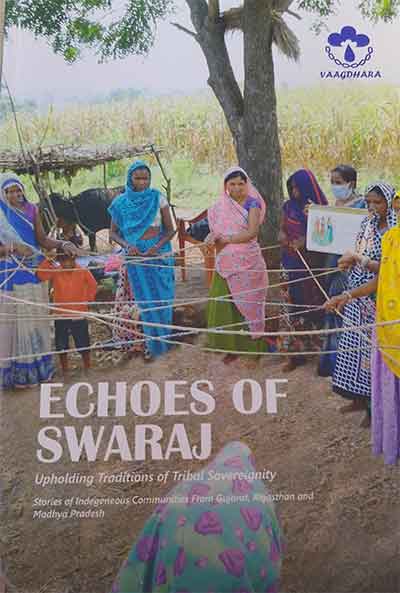“Echoes of Swaraj” is an insightful and inspiring compendium that delves deep into the lives of indigenous communities across Gujarat, Rajasthan, and Madhya Pradesh. It brings forth the compelling stories of transformation, resilience, and hope, illustrating how these communities have not only survived but thrived amidst the rapidly changing socio-economic landscape. Through its narrative, the book upholds the values of Swaraj, a term that connotes self-governance, self-reliance, and sovereignty, particularly in the context of indigenous peoples’ relationship with nature, agriculture, and community leadership.

At its heart, “Echoes of Swaraj” reflects the spirit of Swaraj by highlighting the importance of indigenous traditions, particularly in sustainable farming and natural resource management, which have long been integral to tribal life. As custodians of the environment, these communities have utilized ancient wisdom to harmonize their lives with nature, ensuring a balance that modern agriculture and development have often disrupted. VAAGDHARA, the non-profit organization behind this work, plays a pivotal role in reviving and promoting these traditional practices while supporting local leadership and governance.
The essence of the book lies in its portrayal of indigenous farmers, women, and community leaders who have embraced challenges and, with the support of organizations like VAAGDHARA, have spearheaded innovations that are not only transformative but sustainable. Each chapter tells a story of how these communities have resisted the pressures of modern economic development and climate change through practices rooted in their cultural heritage. They embody the principles of Swaraj, which emphasize self-reliance, respect for nature, and local solutions to global challenges.
The book begins by recognizing the significance of tribal sovereignty, not just in the political sense, but also in terms of cultural and environmental stewardship. Indigenous communities have long practiced a circular, regenerative approach to life and agriculture. Their traditional methods of farming, for instance, are sustainable, climate-sensitive, and geared towards long-term food and nutritional security. This section of the book delves into how these methods are more relevant today than ever, especially as climate change threatens global food systems.
Despite these sustainable practices, tribal communities are often marginalized and face numerous challenges, including economic, social, and political disadvantages. The narrative presents a critical view of how modern economic models have frequently disrupted their traditional livelihoods, pushing them to the margins of society. However, the book counters this bleak outlook with stories of resilience, showing how these communities, with the right support, have reclaimed their sovereignty over food systems, governance, and their futures.
True Farming: Innovation in Sustainable Agriculture One of the central themes of “Echoes of Swaraj” is the transformation in farming practices led by tribal communities. Farming in these regions is not just a livelihood but a way of life, deeply intertwined with cultural values and social structures. The book showcases numerous case studies where indigenous farmers have adopted and adapted both traditional knowledge and modern innovations to combat challenges like erratic weather patterns, water scarcity, and soil degradation.
For instance, the story of Arjun Damor exemplifies how an individual farmer can spark a broader revolution in agricultural practices. Arjun, through sheer determination and with support from VAAGDHARA, shifted from conventional farming to climate-sensitive, sustainable practices. His journey from adversity to empowerment is symbolic of the larger movement towards farming sovereignty, where local solutions, rather than external interventions, are seen as the key to sustainable development.
Similarly, the book tells the stories of women like Kamtu Devi and Bala Devi, who have broken societal barriers and taken the lead in their communities by adopting innovative agricultural practices. Kamtu Devi’s success in poultry farming and Bala Devi’s journey from struggle to becoming a respected farmer in her community highlight the role of women in driving change. These narratives underscore the intersection of gender and sovereignty, showing how empowering women in indigenous communities can lead to broader societal transformations.
The integration of traditional practices with modern scientific methods is another recurring theme in the book. For example, the use of Azolla (a type of water fern) in sustainable farming has transformed the livelihoods of villagers in Amla. This innovative approach, blending indigenous knowledge with ecological solutions, exemplifies how such practices can lead to significant economic and environmental benefits.
At the core of VAAGDHARA’s mission is the belief that sustainable change can only happen through local leadership. “Echoes of Swaraj” highlights the stories of community leaders who have become agents of change by promoting a value-centric approach to governance and development. These leaders, often emerging from the most marginalized sections of society, have become the torchbearers of tribal sovereignty.
The book details the work of individuals like Kamlesh Meena and Kanta Damor, who have pioneered social change in their communities by promoting sustainable agriculture and governance models based on inclusivity and collaboration. Their stories are powerful reminders that leadership is not just about holding a position of power but about being a catalyst for collective action.
The emphasis on youth leadership is another significant aspect of this section. VAAGDHARA’s initiatives focus on nurturing young leaders who can carry forward the principles of Swaraj, ensuring that future generations continue to uphold the values of self-reliance and sustainability. By investing in the leadership potential of young people, particularly in rural and tribal areas, the organization aims to create a new generation of changemakers who are deeply rooted in their cultural heritage but also equipped to tackle modern challenges.
True Governance: Empowering Communities
The concept of governance in “Echoes of Swaraj” goes beyond formal political structures. It is about community-driven decision-making processes that reflect the values of equity, inclusion, and sustainability. The book presents inspiring examples of how indigenous communities have successfully implemented governance models that are participatory and rooted in the principles of Swaraj.
One such example is the Halma initiative, which brings together tribal communities to collectively address challenges such as water scarcity, soil erosion, and deforestation. This community-driven approach, deeply rooted in ancient practices of mutual support and collaboration, has not only revitalized the environment but also strengthened social bonds and governance structures.
The Gram Swaraj Model, which integrates government livelihood programs like MGNREGA (Mahatma Gandhi National Rural Employment Guarantee Act), is another success story featured in the book. This model has empowered villages like Raghunath Singh Ka Garha to combat migration by creating sustainable livelihoods through community participation in governance and natural resource management.
True Childhood: Protecting Rights and Promoting Well-being
The final section of the book focuses on children, highlighting VAAGDHARA’s efforts to secure child rights and promote well-being through community-driven education and health initiatives. The book shares stories of transformation, such as that of Anjali, a child who overcame malnutrition to lead a healthy, thriving life thanks to the Poshan Swaraj Abhiyan (a community nutrition initiative). These stories emphasize the importance of early intervention, education, and health care in breaking the cycle of poverty and ensuring a brighter future for tribal children.
“Echoes of Swaraj” is more than just a collection of success stories; it is a call to action. It serves as a reminder that sustainable development must be locally driven and rooted in the cultural and environmental context of the people it seeks to benefit. Through the inspiring journeys of indigenous farmers, women, community leaders, and children, the book paints a hopeful picture of a future where self-reliance, environmental stewardship, and social equity are at the forefront of development efforts.
The book is a testament to the resilience and ingenuity of India’s tribal communities, whose traditional knowledge and practices offer valuable lessons for addressing some of the most pressing challenges of our time, from climate change to food security. As readers journey through the pages of “Echoes of Swaraj,” they are not only invited to witness the transformative power of these communities but also encouraged to reflect on how they, too, can contribute to a more just, equitable, and sustainable world.
Vikas Parashram Meshram is a social worker and activist working towards the rights of tribal and marginalized communities. Email: [email protected]















































